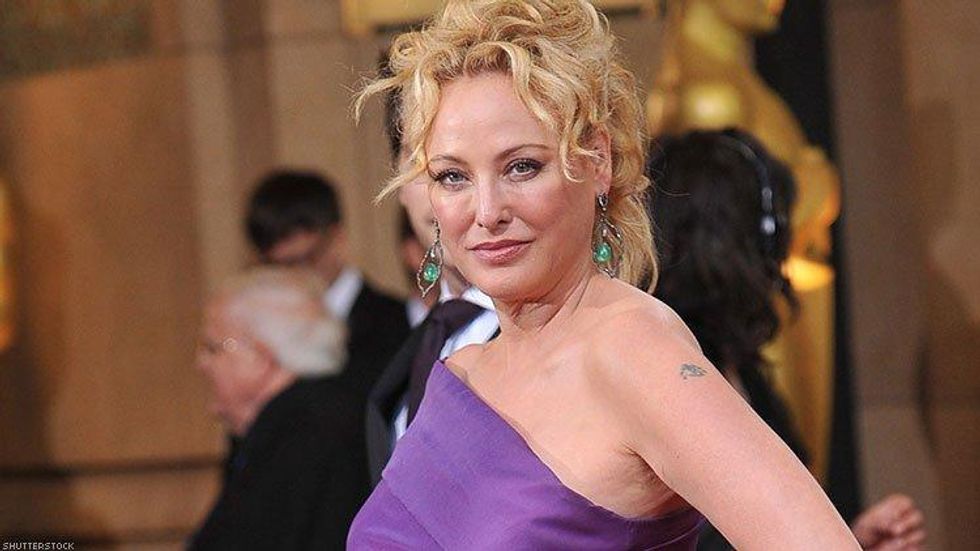Entertainment
Why We Still Need Movies About HIV

Oscar-nominated actress Virginia Madsen talks to us about 1985, her new movie that depicts some of the darkest days of the crisis.
April 25 2018 10:52 AM EST
By continuing to use our site, you agree to our Privacy Policy and Terms of Use.

Oscar-nominated actress Virginia Madsen talks to us about 1985, her new movie that depicts some of the darkest days of the crisis.
The new film 1985 revisits a dark time in gay history, when the AIDS crisis ended so many promising lives. But actress Virginia Madsen, who plays a mother losing her son to the still-mysterious “gay cancer,” sees the film as surprisingly optimistic.
“There is a hopeful message,” she says. “It’s all right, you can be who you are. You can be questioning. You can be nonbinary. Whatever your identity is, you can stand strong in those shoes.”
That may seem a buoyant takeaway from a movie built on so tragic a premise. The film, directed by Yen Tan and starring the recently out Cory Michael Smith in the lead role of Adrian, follows a closeted young man returning home to Texas from New York to share with his family that he’s dying. The film premiered at South by Southwest, has since screened at the Sarasota Film Festival, and will play at the Dallas International Film Festival in May.
The period in which the film takes place corresponds to Madsen’s days as a young actress in Hollywood. And while she enjoyed fame from roles in films like Dune, she also remembers the tragedy of the era, losing friends and family to an ailment no one yet understood.
“It was terrifying, just because nobody knew anything,” she says. “If you had a friend who had those marks on his skin, it was like, ‘It’s going to happen,’ and there was nothing I could do but put my arms around them.”
Madsen lost family to the disease as well. Her uncle Chicky, who moved to San Francisco when Madsen was a child and become largely estranged from the family, died in 1989. The official line to the world was cancer, but it fell on Madsen to explain the truth to Chicky’s mother. “She didn’t know,” Madsen recalls. “She wondered, ‘Did I do something wrong?’ I just talked to her a long time and told her what I knew. I’m sure she would have loved to have been there.”
As for the character Madsen plays in 1985? “I bet this mom would have been there. I imagine she would get on a plane and be by his side,” she says. “The mother I was playing was so understanding and so full of love.”
And that’s where the tale becomes a story of hope. Yes, this film centers on a young man who fled to New York because he could not be himself around family. But he does reunite with his family, and a deeper understanding comes from it.

Madsen sees parallels in her own life and relationship with her fireman father, who could not understand the life of an actress. “It’s not the same as being gay and having to come out, but there’s a similar disconnect,” she says. “He couldn’t connect with me or my brother [actor Michael Madsen] about what we loved.”
At her career ascended, Madsen recalls her father sending fliers about nursing schools. Even on his deathbed, he expressed concern about whether Madsen had a pension. She sees a similar struggle in the father in 1985, played by Michael Chiklis. “He was not a brute or a villain,” Madsen says. “He was just really afraid for his son.”
For Adrian’s younger brother Andrew, played by Aiden Langford, a family coming together in crisis could mean a better world in which to come to grips with his own sexuality. “This is really a story about love,” Madsen says. “It’s the love of a family, the love of brothers, and it’s about two parents who don’t know their son, but they love him so much.”
There’s a scene in the last act of the film where Adrian leaves a letter for his brother. It’s there where Madsen finds the greatest hope for the future. “Maybe he will have the same dilemma with his dad, but he will grow up in a different era,” Madsen says. “He’d probably still have to move away to be who he is, but the times and the people were becoming a little more open-minded. There will be places where he would be embraced for who he is.”
Madsen feels the story will carry relevance with audiences today, many of whom still live in communities where being LGBT gets labeled as abnormal. “There’s a perception that everyone can come out nowadays, and it’s not true,” Madsen says. “It may be true in certain communities. Young people in some situations are able to be who they are when they are 6 years old, but it’s still not the majority.”
Here in 2018, Madsen knows not everyone will hunger for another AIDS drama. She senses much of the love for recent queer blockbuster Call Me by Your Name comes from a lack of townspeople with pitchforks or a deadly disease tearing the couple apart. But in a time when ’80s nostalgia informs entertainment from Ready Player One to Stranger Things, this aspect of the Reagan years can’t be forgotten.
“We are very romantic when we look back,” Madsen says. “Young people have said it must have been so excellent with the fun fashion and the big bows and Madonna, but it’s important we add this to their knowledge. Yes, it’s a tragic story about a gay man who is dying, and it shouldn’t be the only story we tell. But it is a story we have to tell.”